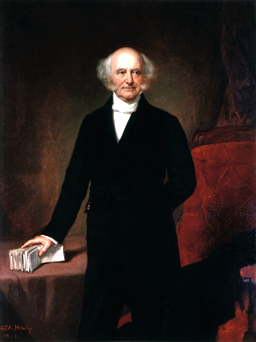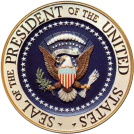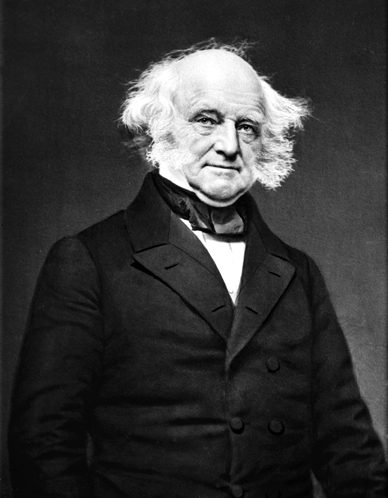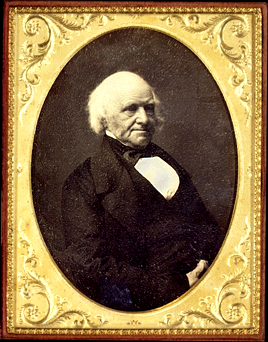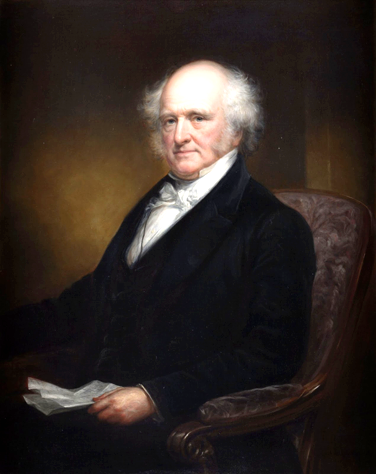|
MARTIN |
|
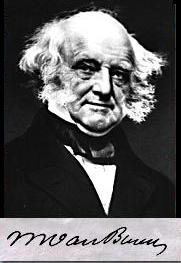
THE 8TH PRESIDENT OF
THE UNITED STATES OF AMERICA
(1837-1841)
VAN BUREN, Martin
(1782Ė1862), eighth president of the U.S. (1837Ė41). Nicknamed the "Fox" and the "Little Magician" for his shrewdly opportunistic political leadership, he was responsible for forming the coalition that became the modern Democratic party.Van Buren was born on Dec. 5, 1782, in Kinderhook, N.Y., of a relatively prosperous middle-class family. He was well educated by private tutors, becoming a lawyer at the age of 20. His law practice was unusually successful, and it enabled him to cultivate the elegant tastes in clothing and life-style that were to earn him a reputation as a dandy. His political career also thrived. He served in the New York state senate from 1812 and 1820 and was the state attorney general from 1816 to 1819. In 1821 the state legislature that he had come to dominate elected him to the U.S. Senate.
Association with Andrew Jackson.
Van Buren was a master politician. During the New York phase of his career he made himself the leader of the Regencyóan upper-class clique that ran the stateís Democratic-Republican party with an iron hand. The principle they admired most was unquestioning party loyalty to the policies they had hammered out. After the election of 1824, Van Buren, who knew little about Andrew Jacksonís beliefs, nevertheless became the guiding spirit in organizing a national Democratic party that in 1828 succeeded in electing Jackson president. He had perceived Jackson as a winner.
As a reward for Van Burenís loyalty and in recognition of his ability, Jackson named him secretary of state. He resigned from that office in 1831 to serve briefly as U.S. minister to Great Britain. Van Buren encouraged the feud between Jackson and Vice-President John C. Calhoun, which led to Van Burenís replacing Calhoun as the presidentís running mate in 1832. With Jacksonís enthusiastic support the Democrats nominated Van Buren for president in 1836. In the face of indecision and splits in the opposing Whig party, Van Buren won easily, becoming the first New Yorker in the White House.
Van Burenís Administration.
In the presidentís office, Van Burenís political magic seemed to desert him, for he failed to command the support even of many within his own party. His chief political problems, however, were not of his own making. Shortly after the financial panic of 1837 the nation experienced a severe economic depression. In telling an emergency session of Congress that he could do little, that "all communities are apt to look to government for far too much," Van Buren was expressing the conventional wisdom of that age. The Independent Treasury Bill that he signed on July 4, 1840, and called the "second declaration of independence," separated government finances from those of the nationís banks, but did little to alleviate the economic misery. In the presidential election four months later Van Buren lost to William Henry Harrison. The public seemed little impressed by "Little Vanís" good sense in resolving foreign policy crises.
Later Life.
In 1844 the Democratic party passed him over for the presidential nomination because of his opposition to the annexation of Texas. Four years later he left the increasingly proslavery Democratic party to accept the presidential nomination of the new Free-Soil party. He was, of course, soundly beaten in the election. Yet, there was something admirable as well as fascinating in the switch by the master of practical politics to the politics of principle.
In his later years Van Buren wrote an autobiography designed to vindicate his administration. He did not succeed. He died in Kinderhook on July 24, 1862.
